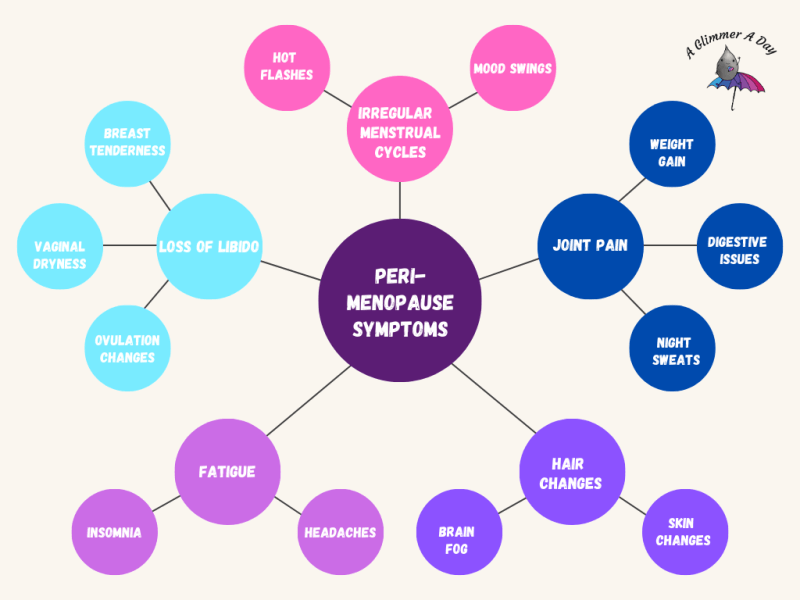Navigating the Storm: Hormones, Peri-Menopause, Our Mental Health and Finding the Glimmers

The Hormonal Journey of Womanhood
The hormonal journey of womanhood is a turbulent one, filled with ups and downs, medical gas-lighting, lack of scientific research and much scapegoating. Females have a monthly menstrual cycle, which involves fluctuations in estrogen and progesterone, in contrast males maintain relatively steady levels of testosterone throughout their adult life, without any cyclical changes. Female hormone cycles are no joke and can seriously affect our physical health, mental health and overall quality of life. At the tender age of 15 I went to my GP and reported horrendous, crippling period pain, heavy blood flow that lasted days, feeling faint, headaches, mood swings, nausea. I was told by a female GP that it was normal and that when I had a baby (wtf!) it would all sort itself out, (reader it did not) and I was promptly put on the first of many hormonal contraceptive pills. No other tests were offered or family history taken to ascertain any history of gynaecological problems. Unfortunately this is an all too common story, women not properly listened to and our needs not met just put on the ‘pill’ to fix the hormones.
”It’s Just Her Hormones”
From pre-puberty, when young girls try to assert their preferences or opinions or exhibit any defiant behaviour or emotion, it is often jokingly put down to ‘hormones’ by their parents. This extends into our adult life as ‘jokes’ such as ‘she must be on her period’ are commonplace whenever a woman indicates that she is not happy with a situation or displays an ‘incorrect’ amount of emotion. This is likely due to a lack of knowledge or understanding about the complexities of female hormones and their effects and well as a healthy dose of stereotyping and misogyny thrown in. Fortunately women’s healthcare is slowly becoming more talked about and savvy employers are realising that utilising policies such as period leave and flexible working to fit in with hormonal cycles will greatly benefit both employer and employee.
Read more here: https://harpersbazaar.com.au/menstrual-leave-australia/
Hormones and Peri-Menopause
One significant phase in this hormonal journey that is traditionally not well known about or understood is peri-menopause, a transitional period before menopause. While it often brings physical changes, it’s essential to shed light on its impact on women’s mental health. Peri-menopause typically begins in a woman’s late 30s or early 40s and is the transitional phase leading up to menopause. During this period, hormonal changes start to occur as the ovaries gradually reduce their production of estrogen and progesterone, leading to irregular menstrual cycles and various physical symptoms.

1. Mood Swings and Emotional Rollercoasters
One of the most common mental health challenges women face during peri-menopause is mood swings. The fluctuating hormone levels can lead to a rollercoaster of emotions. Some days you might feel elated, while on others, you could find yourself in the depths of despair. These emotional ups and downs can be confusing and distressing.
2. Anxiety and Irritability
Anxiety and irritability can become more pronounced during peri-menopause. Hormonal imbalances can trigger or exacerbate anxiety disorders. The worries that once seemed manageable might suddenly feel overwhelming, and your patience may wear thin. It’s crucial to recognize these feelings and seek support if needed.
3. Depression and Low Mood
Depression and low mood are also prevalent during peri-menopause. The hormonal changes can affect neurotransmitters in the brain, leading to feelings of sadness, hopelessness, and even clinical depression. It’s vital to reach out to a healthcare professional if you suspect you’re experiencing depression, as it’s a treatable condition.
4. Sleep Disturbances
Sleep disturbances, such as insomnia and night sweats, often accompany peri-menopause. When you don’t get enough sleep, it can take a toll on your mental health. Sleep deprivation can lead to increased irritability, mood swings, and difficulty concentrating. Establishing good sleep hygiene habits can help mitigate these issues.
5. Brain Fog and Memory Problems
Many women report experiencing “brain fog” during peri-menopause, which can manifest as forgetfulness, difficulty concentrating, and mental confusion. While it can be frustrating, understanding that it’s a common symptom can offer some relief. Strategies like making to-do lists and staying organized can help manage these cognitive challenges.
6. Loss of Libido
Hormonal shifts during peri-menopause can lead to a decrease in libido or interest in sexual activities. This change can strain intimate relationships and impact self-esteem. Open communication with your partner and exploring new ways to connect can help maintain a healthy sex life and boost self-confidence.
Coping Strategies and Finding the Glimmers
Some days can feel overwhelming especially if you don’t have a clue what is actually happening to your body.
- Seek Support: you don’t have to go through peri-menopause alone. Talk to your friends, family, or a therapist about your experiences and feelings. . You are not alone, even though it’s not talked about much 51% of the population are female, we need to talk about it.
- Healthy Lifestyle Choices: eat mostly healthy food with some treats, do some exercise, prioritise making time doing stuff you love to do.
- Chat to your GP or Healthcare Provider to see if they can help in any way (preferably one who specialises in and really understands women’s health- ie won’t tell you to lose weight or have a baby or just go on the pill and other)
- Mindfulness and Relaxation: practices like mindfulness meditation and deep breathing xercises can help you stay grounded and reduce anxiety.
- Look For The Glimmers: Glimmers are simply the little moments in our day to day lives that bring us micro-joys and that give our bodies feelings of calm and safety. Coffee with a friend, finishing a good book, snuggling with your pet, doing a crossword with a glass of wine after a long day on your feet, watching the sunset…
Look for and notice the simple things that bring you joy in your daily life, feel how your body feels more relaxed and regulated. Your body and mind will thank you.
Hormones are Natural But Help is At Hand
Peri-menopause is a natural part of a woman’s life journey, but it can come with significant mental health challenges. The emotional rollercoaster, anxiety, depression, sleep disturbances, and other symptoms can make this phase feel overwhelming. Remember, you’re not alone on this journey, and seeking help and understanding is a vital step toward a healthier, happier you.
